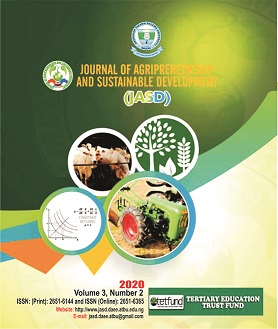EFFECTS OF SASAKAWA GLOBAL-2000 IMPROVED MAIZE PRODUCTION TECHNOLOGY ON FARMERS’ PRODUCTIVITY IN KADUNA STATE, NIGERIA
DOI:
https://doi.org/10.59331/jasd.v3i2.124Keywords:
Adopters, Cooperatives, Productivity index, Sasakawa, TechnologyAbstract
The effect of Non-Governmental Organisations (NGOs) on maize farmers’ productivity cannot be over emphasised in Nigeria. The study analysed the effects of Sasakawa Global 2000 (SG2000) improved maize production technologies on farmers’ productivity in Kaduna State, Nigeria. A total of 263 respondents were selected through a multi-stage sampling technique. Data were collected through structured questionnaire administered to the sampled respondents and complemented with interview schedule. Analysis of the data collected was done using descriptive statistics, total factor productivity index, ordinary least square regression model and chow test analysis. Results showed that the mean age of adopters and non-adopters of SG-2000 improved maize production technology were 45 years and 49 years, respectively. Most of the respondents had one form of formal education or the other. The mean farm size for adopters and non-adopters were 2.26ha and 1.75ha, respectively. The farming experience of adopters and non-adopters were 15 and 24 years with household size of 8 and 6 persons, respectively. The productivity index, ordinary least square and the chow test analysis revealed that SG-2000 improved maize production technologies had significant positive effect on the productivity of the farmers. The severe production constraints faced by the farmers were high cost of acquiring credit facilities, poor road access, inadequate market information, high cost of farm inputs among others. The study recommended that there is the need to strengthen existing farmers’ cooperatives in the study area for easy access to credit, farm inputs and markets.
Downloads

Downloads
Published
How to Cite
Issue
Section
License
Copyright (c) 2022 Journal of Agripreneurship and Sustainable Development

This work is licensed under a Creative Commons Attribution 4.0 International License.






